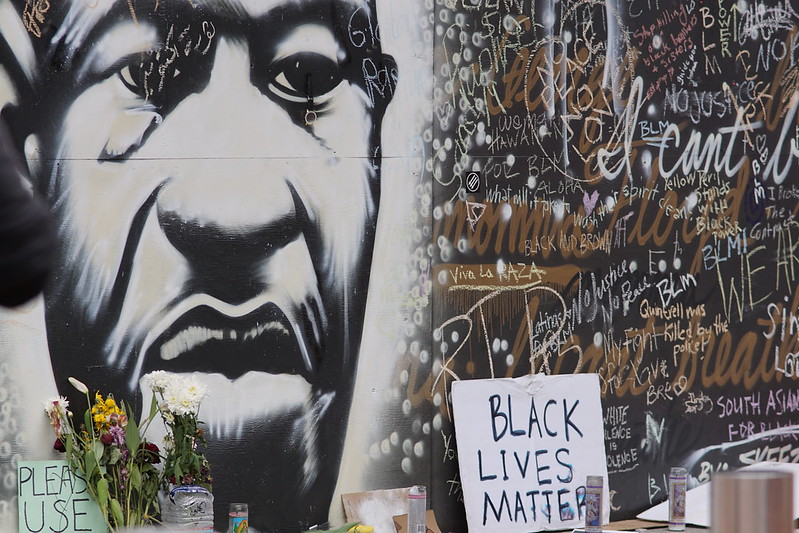Accountability, True Justice and Our Mission to End Hunger
Accountability, True Justice and Our Mission to End Hunger
 Here at Oregon Food Bank and across the country, this week’s guilty verdict in the murder trial of former police officer Derek Chauvin brought on a wave of emotions.
Here at Oregon Food Bank and across the country, this week’s guilty verdict in the murder trial of former police officer Derek Chauvin brought on a wave of emotions.
Like those who knew and loved George Floyd, we felt a sense of accountability. We felt a moment of peace and relief alongside the millions of Black Americans who live in fear for their lives every day. And we shared a sense of trepidation with leaders in Black, Indigenous and other communities of color — caution and concern that this momentous but singular verdict might slow progress toward meaningful, systemic change.
We hold the Floyd family and the entire community in our hearts and minds. And we embrace their statements that, though the verdict is a victory for many, it is only one step in a long road toward justice and equity for all.
We know the road is long because it is marked by so many victims who have yet to see justice done: Duante Wright, Rayshard Brooks, Breeonna Taylor, Atatiana Jefferson, Philando Castile, Freddie Gray, Sandra Bland, Eric Garner, Tamir Rice and more. No sooner was the verdict read than another tragedy emerged: Ma’Khia Bryant, a Black youth who was shot and killed by a White police officer in Columbus, Ohio.
True justice for those who we’ve lost to police violence can only come in the form of equitable, reliable systems — consistent accountability, strong social safety nets, access to affordable food, housing and healthcare, and public policies that shed the historical mantle of White Supremacy and instead offer support to our full communities. True justice is a world where Black lives matter, where we can spend more time celebrating the strength and resilience of our communities than mourning the loss of our loved ones and neighbors.
I would not call today’s verdict justice, however, because justice implies true restoration. But it is accountability, which is the first step towards justice. And now the cause of justice is in your hands.
– Minnesota Attorney General Keith Ellison
Oregon Food Bank holds people experiencing hunger at the center of all we do. And we work systemically to achieve our mission to end hunger and its root causes — both through the distribution of nutritious, culturally-relevant foods and by advancing the policy and institutional changes we need to prevent hunger from occurring. Racism, sexism, classism and cis-sexism are among the chief drivers of hunger and poverty in our communities, and we work actively to dismantle these systems of oppression in our effort to end hunger and its root causes.
This systemic approach includes intentional support of Black-led organizing efforts to advance accountability and ensure everyone in our communities can feel safe, healthy and secure — such as the successful effort in fall 2020 to establish an independent police oversight board in the City of Portland. This year, Oregon Food Bank is advocating for The People’s Budget and its investments in community safety nets, criminal justice reform and expanded access to addiction recovery services. We are also creating guidelines for partner agencies and allies on when it is appropriate to call police, as opposed to reaching out to more situation-relevant and less lethal resources.
As we continue our efforts to emerge stronger from the pandemic, this is the time to ensure that communities have what we need to thrive — to achieve health, safety, well-being and dignity in our daily lives. Disproportional, lethal police violence against Black and Brown bodies mirrors the disproportional impact of hunger in communities of color here in Oregon and Southwest Washington — as well as nationwide achievement gaps in education, housing challenges and public health inequities. Over more than three decades, our work to address food insecurity — and our own lived experiences — confirm the undeniable connection between hunger, racism and other forms of systemic inequities.
This is why we are so clear in our belief that racial justice is food justice — and why our commitment to equity is also a commitment to action toward healing, true justice and transformative change in our communities. We stand in solidarity, whether as fellow Black Americans and people of color, or as allies. And we are here, together, as we advance toward our vision of resilient communities that never know hunger — toward The Beloved Community that Dr. King so beautifully put into words.
Stay connected
Sign up to receive emails with updates, resources and ways to get involved.